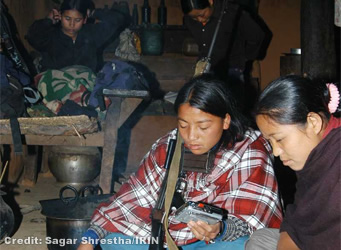
|
 |
| Nepal in Crisis 2006: Facts |
|
|
|
|
|
|
|
|
| Rebels not ready to disarm until peace process completed - Maoist leaders |
Kathmandu,
25 Jul 2006 (IRIN)
Despite spending the last three months engaged in peace talks with the Nepalese government, Maoist rebels are still not prepared to demobilise, disarm or integrate, their leaders said in the Nepalese capital, Kathmandu.
 |
|
The Maoists have waged an armed rebellion against the Nepalese government since 1996, demanding an interim government, a constituent assembly, a new constitution and a republic. They have walked out of previous talks in 2001 and 2003.
The new interim government, formed in April by the country's seven main parties after King Gyanendra gave up direct rule following mass protests, had agreed to meet the PLA's key demands.
 |
|
The CA is considered a provisional governing body that would include the PLA and enable the forming of a new constitution and a democratic state.
The PLA was infuriated when earlier this month the Nepalese government sought support from the United Nations to decommission them.
"Any talk of decommissioning of arms of only the PLA before the election to the constituent assembly is just unthinkable," Prachanda, the Maoist chief said in a letter to UN Secretary-General Kofi Annan.
 |
|
Activists also believed the government had to pay attention to the thousands of landmines that were planted near army barracks in civilian areas around the country.
"The landmines are still a great risk to many innocent civilians who are unaware of where the landmines are planted," said Purna Shova Chitrakar, from the Nepal branch of the International Campaign to Ban Landmines.
Other experts said that the government and the PLA should not delay the DDR process.
"DDR is not just about collecting weapons and counting them and putting them - as they say - beyond use and making them unusable. It is also an important part of the peace process," said Dan Smith, secretary-general of International Alert, a British peace-building NGO.
Deo Bahadur Ghale, a former UN peacekeeping mission expert, said an "immediate agreement" was essential for the DDR process.
Meanwhile, child rights activists have also added their concerns about the need to immediately start the DDR process for former child combatants.
"Early intervention is critical for the normal development of children even without a peace process. If you don't act now it could be too late," said Rosana Vega, a child protection officer for the UN Children's Fund (UNICEF) in Nepal, said.
Copyright © UN Office for the Coordination of Humanitarian Affairs 2006
[ This report does not necessarily reflect the views of the United Nations]
Integrated Regional Information Networks (IRIN), part of the UN Office for the Coordination of Humanitarian Affairs (OCHA).

|
